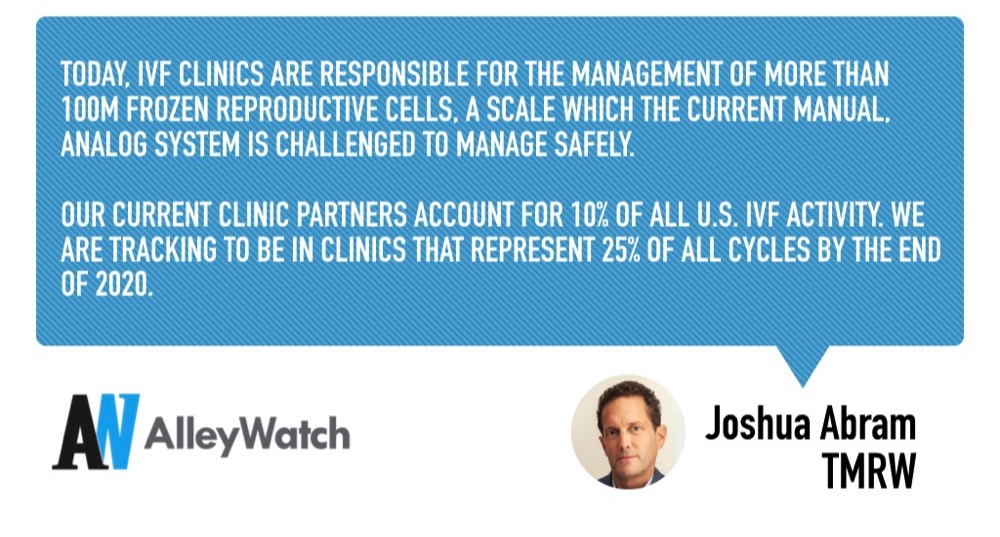In 1978, the world’s first IVF baby was born and since then approximately 8M babies worldwide have been born as a result of IVF. Even though IVF has made significant advances, current infrastructure at IVF clinics is insufficient to keep up with IVF’s growing demand. TMRW Life Sciences created ivfOS™ to help clinics safely and effectively manage millions of vitrified fertility cells. Currently, IVF clinics are responsible for managing over 100M frozen reproductive cells. ivfOS™ automation has the potential to relieve embryologists of error-prone, manual tasks, allowing embryologists to focus on the very important aspects of IVF.
AlleyWatch interviewed Joshua Abram to learn more about IVF and TMRW Life Sciences’ solution. After raising a total funding amount of $37M over two rounds, TMRW plans to launch commercially in the first half of 2020 and eventually expand globally.
Who were your investors and how much did you raise?
We raised $25M in a Series B funding led by 5AM Ventures.
Tell us about the product or service that TMRW Life Sciences offers.
TMRW Life Sciences (“TMRW”) is the creator of ivfOS™, an integrated platform for automated, software-guided embryology and cryo-management. The TMRW ivfOS™ platform is poised to play a central role in the conception of tens of millions of people in the coming years.
TMRW provides a 100% physical and digital chain of custody, protecting and tracking eggs, embryos, and sperm through RFID-enabled technology.
To set the scene: in the coming decades, In Vitro Fertilization (IVF) will be responsible for nearly 300 million births. Almost all of these IVF births today stem from egg, embryo, and sperm that were vitrified (frozen extremely quickly) and cryopreserved at -190 degrees Celsius. In the majority of cases, this period of preservation extends over many years.
Vitrification—a medical breakthrough only recently adopted for widespread use—offers a number of advantages. It can help to eliminate multiple-birth pregnancies, facilitate genetic testing, and provide would-be parents more control over their reproductive planning. We are quickly moving to a “freeze-all” future in which almost all IVF births will be associated with fertility cells that were once frozen. But despite the many advantages of vitrification for patients and clinicians alike, IVF clinics simply do not currently have the infrastructure to safely and efficiently manage the fast-growing demands of cryo-managing millions of fertility cells.
TMRW’s automation is fully scalable and eliminates error-prone, manual tasks in the IVF lab, allowing embryologists to focus on the most skilled and technical aspects of their work.
 What inspired the start of TMRW Life Sciences?
What inspired the start of TMRW Life Sciences?
My cofounder and Co-CEO Alan Murray and I were catching up with a former colleague of ours who shared that she’d recently undergone IVF, and there had been complications. This piqued our interest to a problem that could be solved, so we conducted significant research. We quickly learned that vitrification was becoming a more prevalent part of the IVF process and that the technology being used to manage vitrified cells was very antiquated. Having both come from data science backgrounds where everything can be tracked and is accessible in real-time, we couldn’t believe that life’s most precious cells were not being similarly tracked and managed.
We developed a resulting technology with our third Founder, Jeff Port, M.D., a Thoracic Surgeon and Professor at Weill Cornell Medicine. Jeff pioneered the use of Radio Frequency Identification (RFID) for surgical applications and sold his company, RF Surgical Systems, to Medtronic.
We then began assembling a team that included many of the world’s most celebrated pioneers in clinical medicine, reproductive biology, embryology, and cryogenic biobanking who have synthesized their collective knowledge, vision, and experience to develop the TMRW system.
Is there an emotional part involved in this industry?
Our business is protecting life’s most precious cells, so there is a strong emotional component. That is why we are relentless in ensuring we partner with the best clinics in the world who understand how powerful digital chain of custody and automated cryo-management is to the safety and security of cells under their care.
How is TMRW Life Sciences different?
TMRW Life Sciences is the only company that has brought together all of these technologies (RFID, robotics, digital chain of custody, advanced telemetry, etc.) into one integrated platform to solve the problems facing modern IVF labs.
What market does TMRW Life Sciences target and how big is it?
We are initially targeting the IVF services market, which was globally valued at $4.3B in 2016 and is expected to reach $8.6B by 2024, according to Allied Market Research Report, Global Fertility Services Market, 2017-2023.
Today, IVF clinics are responsible for the management of more than 100M frozen reproductive cells, a scale which the current manual, analog system is challenged to manage safely.
Our current clinic partners account for 10% of all U.S. IVF activity. We are tracking to be in clinics that represent 25% of all cycles by the end of 2020.
What’s your business model?
SaaS. We provide clinics with our ivfOS platform – which features hardware, software, and proprietary labware – without any CapEx. We charge clinic clients approximately $20 per patient per month.
What was the funding process like?
We met with many potential investors, including strategic partners. We chose 5AM Ventures because of its life sciences pedigree and the strength of its team.
What are the biggest challenges that you faced while raising capital?
In all honesty, the biggest challenge was choosing the right partner. Fortunately, every investor we met with immediately understood the value of the TMRW ivfOS and its importance in creating a safer IVF experience for patients and clinics alike.
What factors about your business led your investors to write the check?
First and foremost, we’re a much-needed solution to an urgent problem that can impact future generations. In many respects, fertility clinics have become victims of their remarkable success. They are managing more vitrified fertility cells than they could have ever imagined. For years, there was no need to think much about cryo-management, and then seemingly overnight, clinics became responsible for managing tens of millions of cells. 5AM realizes this is a large market that will only continue to grow and that TMRW can be a partner to leading fertility clinics.
In many respects, fertility clinics have become victims of their remarkable success. They are managing more vitrified fertility cells than they could have ever imagined. For years, there was no need to think much about cryo-management, and then seemingly overnight, clinics became responsible for managing tens of millions of cells.
What are the milestones you plan to achieve in the next six months?
We will launch commercially in the first half of 2020, going live in multiple clinics, with plans for global expansion shortly thereafter.
What advice can you offer companies in New York that do not have a fresh injection of capital in the bank?
My advice would be to focus on demonstrating a compelling proof of concept and take as many meetings as possible. The funding will find them. Time-consuming as it may be, fundraising is a terrific learning opportunity. Getting feedback from smart investors is often a source of valuable new ideas.
Where do you see the company going now over the near term?
We are 100% focused on flawlessly executing our commercial launch and international expansion. Once we accomplish that, we’ll examine whether there are other applications for the technology. However, our immediate goal is to be in every leading clinic in the world.
Where is your favorite bar in the city for an after-work drink?
The NoMad Bar.





